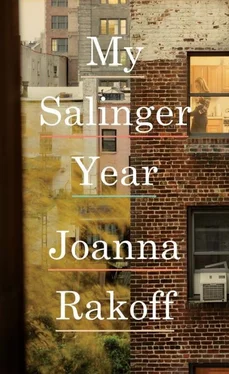For a moment, Hugh stared off into the middle distance, his mind presumably drifting to some better place, where he could sit eternally and sift his papers without being called to perform tedious tasks for an unseen master. My boss tapped her foot, which was surprisingly tiny, almost hooflike, and shod in a beige orthopedic-style shoe. “End of the day tomorrow,” Hugh told her. “Maybe sooner. Why does he want them? What does he need them for?”
“Who knows?” my boss said. “He’s always wanting to check up on Little, Brown. You know. He’s convinced they’re making mistakes. And they do make mistakes.” Suddenly she noticed the cigarette in her hand, which had burned down to the filter. Just as the ash began to fall on the carpet, she dropped it into a small black ashtray on the credenza outside Hugh’s office, specks of gray softly depositing themselves on her shoes and the carpet around them. “Darn it,” she said quietly. “Just get them. Don’t worry about why he needs them.”
“Okay,” said Hugh, glancing at me for the first time and offering a small smile. “Whatever Jerry wants.”
2

Office Equipment
For weeks I typed and typed and typed. I typed so much that I dreamed of typing. In my dreams, my fingers ran over the keys and nothing happened, though my ribbon was intact and my machine appeared to be functioning. Instead of letters imprinting on paper, birds flew out of the innards of my typewriter, chirping and flapping, or swarms of white dusty moths, some huge, some tiny, and took up roost around the office. The hum of the machine filled my days, a backdrop to every conversation, every word I read, so that when I shut the Selectric off at the end of the day, and sheathed it in its plastic cover, the ensuing silence filled me with immeasurable joy.
James had an affinity for the office hardware and was often called upon to resolve technological issues, such as malfunctions with the fax machine or clogs in the photocopier. Both were relatively new additions to the office. Only a couple of years before my arrival, James told me, the agents had still communicated with their sister agency in England via an enormous telex machine. In the files, I found missives from the late 1980s imprinted on long, columnar sheets of telex paper, in that device’s charmingly chunky lettering, a font I associated with a different era, with Thin Man movies and steamship travel. The Agency, it seemed, had held on to that era, fox stoles and all, as long as it could. It was still holding on, of course, but the modern age was encroaching, in manifold ways. A few years earlier, one of the agents—now retired—had convinced his colleagues that he needed a fax machine in order to properly look after their clients’ film rights, as was his province. In Hollywood, communication via fax was de rigueur; deals happened too quickly for the U.S. Postal Service. And so a fax machine was installed by the coffeemaker, the telex machine retired, though it sat in the office for years, just in case such technology should be called into service again.
The photocopier was a relatively recent acquisition, too. Until just a few years prior, assistants had typed every letter in duplicate, inserting into their typewriters a paper sandwich consisting of a thick sheet of creamy letterhead, a slender black wisp of carbon, and a piece of soft, pulpy yellow paper, on which the carbon imprinted a copy of the note. Copies of all correspondence, even those notes that simply said, “Attached is a countersigned agreement for your records,” were kept and eventually filed away in folders devoted to each of the Agency’s authors. Now, though, we assistants didn’t need to bother with carbons. We could simply type up our letters and Xerox them. How lucky we were! My boss, and Hugh, and James—and any number of others—reminded me of this from time to time. We were spoiled, my generation, by modern convenience!
James had started at the Agency six years earlier as assistant to Carolyn, who sold foreign rights and who had been there even longer than my boss, since the 1960s or earlier, no one knew for sure. Tiny as a child, Carolyn spoke in a low, sophisticated southern drawl and dyed her hair a rusty shade of red that—based on her freckled complexion—must have approximated its color in her youth, which was now gone, though it was not clear how long. I guessed she was about seventy, but she could have been older or younger, her diminutive size and smoker’s wrinkles—like my boss, she smoked long, slender Mores—throwing off all guesses. Often, in the afternoons, she fell asleep at her desk, her head curled into her chest like a baby bird; the first time I’d happened upon her in this position—as I walked by her office on my way to the bathroom—I started, thinking she’d passed into a deeper state than sleep. Then she let out a long burp.
Though James now had his own lovely, book-lined office, he was still officially considered Carolyn’s assistant. Or so I discovered one morning, when I walked by his office and found him typing, calmly and quickly, the Dictaphone headgear perched oddly atop his leonine head. He was thirty, the same age as Don, and married. And yet he was still someone’s assistant, after six years of employment and with an Ivy League degree. With a wife .
Now that I understood this, I looked away in embarrassment when I encountered him typing or filing correspondence in the big metal cabinets behind the finance desks. But James didn’t mind, really, typing letters for Carolyn, he told me one afternoon in February, the office already dark as midnight, though it was barely four o’clock. My boss had gone home early to take care of a matter involving the people I often heard her talking about or to: Daniel and Helen. I still didn’t understand who they were and how they fit into her life, but it was clear that they took up much of her time. She also regularly left early to check in on Dorothy, who I now knew was the Agency’s former president, a formidable and legendary agent, in her nineties and felled by a stroke. She’d never married, never had children. “She kind of married the Agency,” James told me. And now the Agency—in the form of my boss, her successor—took care of her. She herself had been the successor to the Agency’s founder, and the person who’d discovered Salinger, who’d sent his stories to The New Yorker over and over again, until finally William Maxwell accepted one, “Slight Rebellion off Madison,” which would eventually become The Catcher in the Rye . “You can look at the card,” Hugh told me excitedly. The Agency used a bizarre, overly complicated system for tracking submissions—of both books and stories, though there wasn’t much business in the latter anymore—involving the oversized pink cards I’d found in my desk that first day, on which one recorded the various editors who had seen it, the days on which one called to check in on it, the sale and contractual terms when sold, and so on. These cards appeared to have been invented by the Agency’s founder and were produced specifically for our use. It was the assistants, of course, who typed them up, squeezing impossible amounts of information into the network of grids and lines. “You know what else is neat?” Hugh said, an almost mischievous glint in his pale eyes. “Look up the card for The Catcher in the Rye .” Dorothy had, of course, made that sale, too. The large, windowed area we now used as a conference room had once been her office. Hugh, when he first started at the Agency, as her assistant, had sat in there with her, taking live dictation. Perhaps we assistants did have it easy now, with our Xerox machine and our Dictaphones.
Читать дальше













